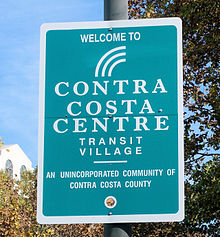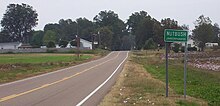Unincorporated area
Postal addresses in unincorporated areas, as in other parts of Australia, normally use the suburb or locality names gazetted by the relevant state or territorial government.These range from small hamlets to large urbanized areas similar in size to a town or city.[2] For example, were they incorporated, the urban service areas of Fort McMurray in the Regional Municipality of Wood Buffalo and Sherwood Park in Strathcona County would be the fifth- and sixth-largest cities in Alberta.[3] In some provinces, large tracts of undeveloped wilderness or rural country are unorganized areas that fall directly under the provincial jurisdiction.These are parts of the regions and do not form self-governing municipalities, but are rather governed by military offices (újezdní úřad), which are subordinate to the Ministry of Defence.However, a few unincorporated areas exist, whether because of omissions and ambiguities left in official maps dating from the British Mandate for Palestine, or due to deliberate policy of ensuring facilities of national importance, such as Ben Gurion Airport, Mikveh Israel boarding school, or the BAZAN Group oil refineries, would not have their operation affected by local considerations.Most of the other island groups are not part of any administrative region or district, but are instead each designated as an Area Outside Territorial Authority.[1] An unincorporated community is one general term for a geographic area having a common social identity without municipal organization or official political designation (i.e., incorporation as a city or town).Differences in state laws regarding the incorporation of communities leads to a great variation in the distribution and nature of unincorporated areas.In New Jersey, multiple types exist, as well, such as city, township, town, borough, or village, but these differences are in the structure of the legislative branches, not in the powers or functions of the entities themselves.On the opposite end of the spectrum is the Virginia "strong county" model.[11] Virginia and other states with this model, such as Alabama, Maryland, and Tennessee, set strict requirements on incorporation or grant counties broad powers that in other states are carried out by cities, creating a disincentive to incorporate, and thus have large urbanized areas which have no municipal government below the county level.In mid-Atlantic states such as New York and Pennsylvania, a hybrid model[11] that tries to balance the two approaches is prevalent,[12] with differing allocations of power between municipalities and counties existing.Throughout the U.S., some large cities have annexed all surrounding unincorporated areas within their counties, creating what are known as consolidated city–county forms of government (e.g., Jacksonville, Florida, and Nashville, Tennessee).[17] The United States Minor Outlying Islands without a permanent civilian population are "unorganized" in the sense that they do not have a local government, and they are administered by the Office of Insular Affairs directly.The populated American Samoa is "unorganized" in the sense that Congress has not passed an organic act, but it does have a constitution and locally elected territorial legislature and executive.[21] Many unincorporated communities are also recognized as acceptable place names for use in mailing addresses by the United States Postal Service (USPS) (indeed, some have their own post offices), and the Census Bureau uses the names of some widely recognized unincorporated communities for its CDPs for which it tabulates census data.Postal Service establishes ZIP codes and mailing addresses to maximize the efficiency of their system, not to recognize jurisdictional boundaries.Only after the city was incorporated in 2005 was "Sandy Springs" approved for use in mailing addresses, though "Atlanta" remains the default name.If an unincorporated area becomes incorporated, it may be split among ZIP Codes, and its new name may be recognized as acceptable for use with some or all of them in mailing addresses, as has been the case in Johns Creek and Milton, Georgia.If an incorporated area disincorporates, though, this has no effect on whether a place name is "acceptable" in a mailing address or not, as is the case with Lithia Springs, Georgia.



Contra Costa Centre Transit VillageContra Costa County, CaliforniaWalnut Creek, Californiamunicipal corporationChubutCórdobaEntre RíosFormosaNeuquénRío NegroSan LuisSanta CruzSantiago del EsteroTierra del FuegoTucumánone level of local governmentstate and territorialsuburb or localityUnorganized areahamletsAlbertaurban service areasFort McMurrayRegional Municipality of Wood BuffaloSherwood ParkStrathcona Countydesignated placeunorganizedlocal services boardlocal service districtBoletice Military Training AreamunicipalitiesregionsMinistry of DefenceOlomoucMěsto LibaváKarlovy VaryBoleticeSouth BohemianKájovSouth MoravianVyškovprotected landscape areaErtholmenearchipelagoBornholmChristiansøKarlskronaStatistics DenmarkGermanBavariamilitary training areasOsterheideLohheideGutsbezirk MünsingenBaden-WürttembergHarz (Landkreis Goslar)GoslarLower SaxonyHarz (Landkreis Göttingen)GöttingenGutsbezirk ReinhardswaldKasselHessenHeidekreisNortheimGutsbezirk SpessartMain-Kinzig-KreisGarmisch-PartenkirchenReutlingenSachsenwaldHerzogtum LauenburgSchleswig-HolsteinVeldensteiner ForstBayreuthGöhrdeLüchow-DannenbergWerra-Meißner-Kreislocal councilregional councilBritish Mandate for PalestineBen Gurion AirportMikveh IsraelBAZAN GroupBeershebaDimonaunrecognizedAbu Basma Regional CouncilNeve Midbar Regional Councilal-Kasom Regional CouncilpoldersLanddrostWorld War IISouthern FlevolandquicksandAlmereMarkermeerNew Zealand outlying islandsChatham Islandsterritorial authorityregiondistrictBouvet IslandJan MayenSvalbardcountiesLongyearbyen Community CouncilgovernorNutbushHaywood County, Tennesseelocal government in the United StatescountyHyannis, MassachusettsBarnstableIntervale, New HampshireBartlettConwayHovland, MinnesotaNutbush, TennesseeYucca, Arizonahome rulecounty commissionsboardscity councilstown councilsminor civil divisions